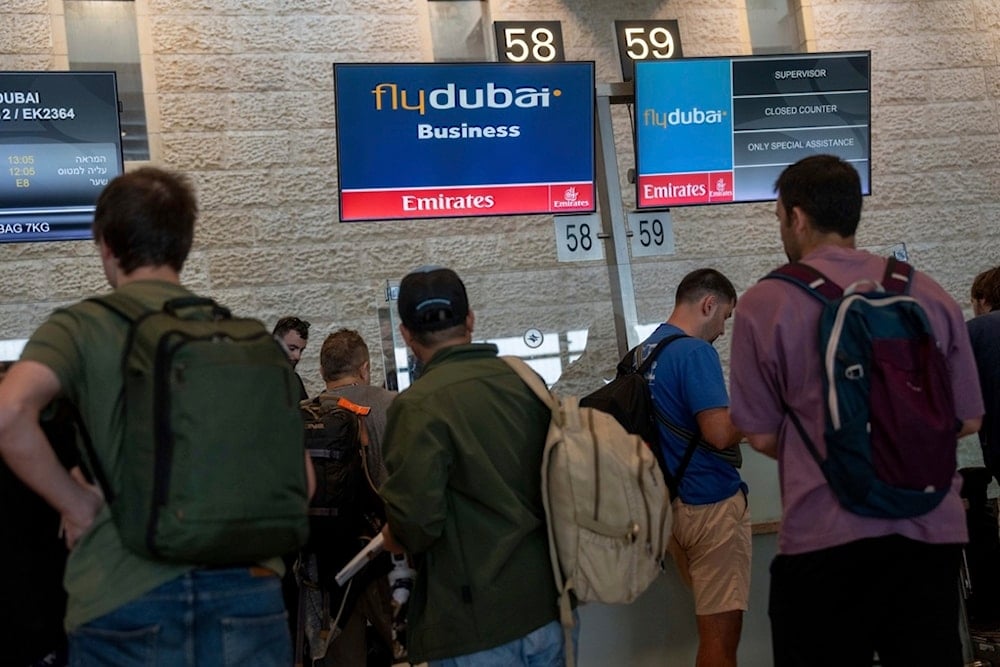Tourism in 'Israel' collapsing amid ongoing wars
The Israeli occupation's tourism sector has taken a severe hit amid the ongoing wars on Gaza and Lebanon, jeopardizing a vital economic inlet for the occupation.
-

Travelers line up for check at the Fly Dubai airline counter at Ben Gurion International Airport in al-Lydd, occupied Palestine, Sunday, November 10, 2024. (AP)
The Israeli occupation's tourism industry is facing a sharp decline amid the ongoing war on Gaza, with hotel stays plummeting and many establishments shutting down.
According to a report released by the Israeli Hotel Association on Sunday, hotel bookings fell by 29% in October compared to the same month last year, marking a significant blow to the sector.
Tourism activity in "Israel" has dropped by 20%, with international tourist stays nearly vanishing. Only 120,000 overnight stays by international visitors were recorded in October, representing a 63% decrease from October 2023 and a staggering 86% drop compared to October 2022.
The overall impact in 2024 has been severe, with only 1.6 million tourist stays recorded so far, a steep decline from the 7.5 million stays in 2023. Total hotel stays in October reached 1.58 million, down 29% from the previous year, despite coinciding with Jewish holidays such as Rosh Hashanah and Sukkot, which typically boost travel.
Sivan Detooker, director-general of the Israeli Hotel Association, stated, "Since the beginning of the war, around 90 hotels have closed, nearly 20% of all hotel services, and the situation continues to deteriorate."
Even with major Jewish holidays in October, traditionally a peak period for tourism, the sector generated only 1.58 million shekels (approximately $0.4 million), far below expectations. Demand among settlers for hotels also fell by 29% compared to October 2023.
Devastating effects of war
The war's effects have been particularly acute in northern occupied Palestine, where the war has drastically reduced local travel. Cities like Haifa, Tabarayya, and al-Nasirah reported occupancy declines of 51%, 45%, and 80%, respectively.
The average hotel occupancy rate in October was 51%, a 63% decrease from last year and the lowest monthly rate recorded in 2024.
As the war rages on, "Israel's" economy is sinking. Earlier last month, passenger traffic at Tel Aviv’s Ben Gurion International Airport dropped by 43% during the first nine months of 2024 due to the escalations and war on Gaza and the northern front after October 7, which led many airlines to scale back or withdraw flights.
According to the airport authority, the airport served 10.85 million international passengers from January to September, a decrease from 19.01 million in 2023.
Deteriorating economy
S&P's newest assessment on "Israel", issued earlier in November, states that the war on Gaza and Lebanon is anticipated to continue into 2025, delaying the occupation's economic recovery until 2026, Globes reported.
The international ratings agency lowered "Israel's" rating to A- last month with a negative outlook and predicts the occupation will have 0% growth in 2024, resulting in a GDP per capita decrease.
Only in 2025 will the Israeli economy begin to recover, with a moderate 2.2% increase.
According to S&P, the budget deficit would reach 9% of GDP by the end of 2024 and stay high at 5%-6% of GDP until 2027. These values are significantly higher than those expected by the Ministry of Finance, which might be attributed to differences in computation methodologies. Net government debt is predicted to reach 70% of GDP by 2027, an increase of 12% from 2023.
The agency predicts that the current account surplus will average 3.3% of GDP between 2024 and 2027.
The primary risk identified by S&P is a potential additional escalation in the north between the occupation forces and the Lebanese Resistance - Hezbollah, as well as a possible direct war with Iran.
Along with defense issues, the industry reports worsening relations with major partners. "The grave humanitarian situation and the increase in the number of civilians being hurt in Gaza, and increasingly also in Lebanon, have led to a number of public disputes between Prime Minister Benjamin Netanyahu and main allies including the US and UK."

 4 Min Read
4 Min Read








